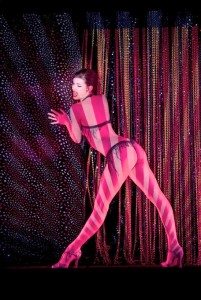By MCN Editor editor@moviecitynews.com
CRAZY HORSE, FREDERICK WISEMAN’S LATEST, TO OPEN THEATRICALLY ON JANUARY 18, 2012 AFTER PLAYING IN VENICE, TORONTO AND NEW YORK FILM FESTIVALS
CRAZY HORSE, FREDERICK WISEMAN’S LATEST, TO OPEN THEATRICALLY ON JANUARY 18, 2012 AFTER PLAYING IN VENICE, TORONTO AND NEW YORK FILM FESTIVALS
Zipporah Films and mTuckman media dance again on documentary about famous Parisian cabaret club
New York, NY (August 28, 2010) – Zipporah Films announced today that it will once again work with Michael Tuckman and mTuckman media to release Frederick Wiseman’s latest documentary, CRAZY HORSE.
 The film will have its world premiere at the Venice Film Festival on August 31st and will also be featured at the Toronto International Film Festival and New York International Film Festival. CRAZY HORSE will then open theatrically in New York City at Film Forum on January 18, 2012, followed by a national rollout to theaters across the country.
The film will have its world premiere at the Venice Film Festival on August 31st and will also be featured at the Toronto International Film Festival and New York International Film Festival. CRAZY HORSE will then open theatrically in New York City at Film Forum on January 18, 2012, followed by a national rollout to theaters across the country.
CRAZY HORSE joins LA DANSE – THE PARIS OPERA BALLET and LA COMÉDIE-FRANÇAISE OU L’AMOUR JOUÉ to make a trilogy of Wiseman films about iconic French institutions.
Frederick Wiseman spent ten weeks with his camera exploring one of the most mythic places dedicated to women: The Crazy Horse. Over the years this legendary Parisian cabaret club, founded in 1951 by Alain Bernardin, has become the Parisian nightlife ‘must’ for any visitors, ranking alongside the Eiffel Tower and The Louvre.
Wiseman’s impeccable eye allows us to enter into this intriguing international temple of the Parisian club world and to discover what makes the Crazy Horse tick: elegance, perfectionism and a grueling schedule (with two shows a night and three on Saturdays, seven days a week).
CRAZY HORSE follows the rehearsals and performances for a new show called “DÉSIRS,” staged by Philippe Decouflé, a celebrated French choreographer, as well as the backstage preparations of the dancers (make-up and costume fittings) and also the various issues involved in the planning of the show and the administration of the club. The show DÉSIRS is an artistic, modern, humorous and colorful spectacle that is the pinnacle of ‘nude chic.’
Following the successful runs of LA DANSE and BOXING GYM in each of the last two years, CRAZY HORSE is Wiseman’s 39th film in a career that began in 1967 with TITICUT FOLLIES. Critic Philip Lopate has called Frederick Wiseman “the greatest American filmmaker of the last 30 years.” Zipporah Films, Inc. is the distributor of Wiseman’s films. For over forty years, he has created an exceptional body of work consisting of films devoted primarily to exploring contemporary life as it is expressed in institutions common to all societies (schools, hospitals, the military, police, prisons, courts, public housing, theater, ballet, and many other topics). For more information, please visit http://www.zipporah.com.
CRAZY HORSE at:
Venice Days – Venice Film Festival – http://www.venice-days.com/filmsearcheng.asp?idfilm=7
Toronto International Film Festival – http://tiff.net/filmsandschedules/tiff/2011/crazyhorse
Vancouver International Film Festival – http://www.viff.org/e-blasts/viff-2011/2011-08-09-PR.html
San Sebastian Film Festival – http://www.sansebastianfestival.com/in/pagina.php?ap=1&id=2093
Doclisboa 2011 – http://www.doclisboa.org/2011/
New York Film Festival – http://www.filmlinc.com/films/on-sale/crazy-horse
BFI London Film Festival – http://www.bfi.org.uk/lff/
Tokyo International Film Festival – http://www.tiff-jp.net/en/
Film Forum – http://www.filmforum.org/comingsoon.html
# # #















